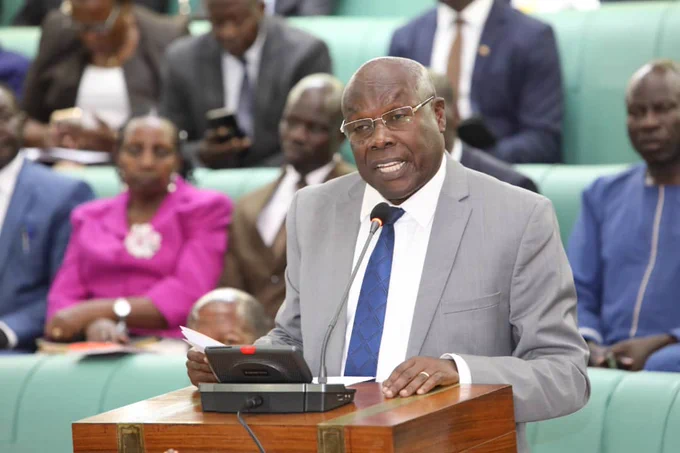During plenary on Tuesday September 05, 2023, the Minister of State for Energy in Uganda, Hon. Sidronius Okaasai, delivered a statement addressing the uncontrolled surge in fuel prices.
The minister attributed Uganda’s fuel price increases to a combination of global factors, including OPEC+ supply cuts, positive macroeconomic sentiment, strong global oil demand, seasonal impacts in Europe and the United States, foreign exchange fluctuations, and a noticeable rise in oil prices.
Speaker of Parliament Rt Hon Anita Among had previously questioned the government about the continuously rising fuel prices, and Hon. Okaasai’s statement implied that the government would maintain a hands-off approach to commodity pricing.
Minister Okaasai emphasized Uganda’s operation of a liberalized downstream petroleum market, where fuel prices are determined by market forces of demand and supply, as per the Petroleum Supply Act of 2003 and Petroleum Supply General Regulations (2009), with subsequent amendments.
“Uganda operates a liberalised downstream petroleum market, where pump prices are determined by the forces of demand and supply as guided by the Petroleum Supply Act of 2003 and Petroleum Supply General Regulations (2009) with amendments of 2012 and 2018,” said Okaasai
He argued that global factors, beyond Uganda’s control, were primarily responsible for the escalating fuel prices, further adding to the MPs’ frustration.
He blamed the high fuel prices on increased world oil demand which has reached record levels, with demand hitting 103 million barrels per day in June 2023.
“As a net importer of petroleum products, Uganda is a price taker. This means that when global oil prices rise, it directly affects prices at the pump in Uganda” he explained
Adding that; “Despite being a landlocked country, Uganda’s fuel prices remain competitive, and transit trucks often purchase diesel in Uganda before crossing into Kenya due to lower prices”
He cited a surge in global oil demand, especially during the summer seasons in Europe and the United States, as a significant driver behind the spike in oil prices worldwide. This high demand, fueled by seasonal factors and increased economic activity, has contributed significantly to the soaring fuel costs.
A section of Members of Parliament (MPs) were left unconvinced by the government’s stance.
In response to Minister Okaasai’s statement, Hon. Ibrahim Ssemujju, Mp Kira municipality expressed his discontent, particularly concerning the issue of fuel reserves. He demanded answers regarding the status of these reserves and suggested that Parliament reject the minister’s statement unless concrete solutions were provided.
“This government worth its name should come and explain what happened to the fuel reserves; not just downloading material from Google.” Ssemujju uttered
Speaker Anita Among echoed these sentiments, calling on the government to develop a tangible plan to address the rising fuel prices instead of relying solely on market forces. She asked for details on the government’s immediate, medium-term, and long-term strategies to address the issue.
Ssemujju moved a motion under Rule 59 that Parliament rejects the Minister of Energy’s statement on fuel, saying it doesn’t provide interventions from the government.
However, the House voted against the motion. The Speaker ruled that the motion, together with the committee report be debated tomorrow.
Notably, neighboring Tanzania had led the region in the recent wave of fuel price hikes, with Uganda now grappling with similar challenges.
Kenya introduced a ‘Fuel Stabilization Fund’ as a form of subsidization to counter rising fuel prices.




